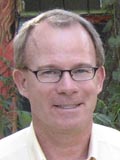In 2013, the Department of Homeland Security reacted to a series of human-caused tragedies and natural disasters that included the Virginia Tech shooting in 2007, Hurricane Ike striking the Texas A&M Galveston campus in 2008 and the Sandy Hook Elementary School shooting in 2012. The department formed an advisory council chaired by Chancellor R. Bowen Loftin, then president of Texas A&M, to study matters related to security and the academic community.
Now, four researchers, with financing from a $100,000 Mizzou Advantage grant, are studying what to do when disaster strikes and how to promote campus resiliency at the University of Missouri.
“It was an interesting challenge to say, ‘How do you take a community resilience expert, a virtual reality expert, a community database expert and a strategic health communication expert and forge a synthesis to devise better ways to equip the disaster response community?’ ” said team member Glen T. Cameron.
 Brian Houston
Brian Houston
Assistant professor of communication and co-director of the Terrorism and Disaster Center
Brian Houston and his team at the Terrorism and Disaster Center research the long-term effects of natural disasters and human-caused tragedies. The center also investigates how people rebuild after the occurrences. Via an online survey, Houston measured perceptions of campus resiliency, or the ability of the MU campus to bounce back after a crisis or disaster. He is currently analyzing the data to determine how to make the university more resilient so that if a crisis happens, the community can recover more quickly.
 Glen T. Cameron
Glen T. Cameron
Professor and the Maxine Wilson Gregory Chair in Journalism Research and co-director of the Health Communication Research Center
Glen T. Cameron is developing, identifying and cultivating community members who have skills that would be valuable at a disaster site. “My part is to develop an online tool to identify [campus community members] who would be excellent prospects as first responders during disaster,” Cameron said. After identifying them, Cameron plans to test their performance in a virtual event.
 Bimal Balakrishnan
Bimal Balakrishnan
Associate professor of architectural studies and director of the Immersive Visualization Lab
Bimal Balakrishnan is using new media, such as 3-D modeling tools, to experience buildings before construction begins. He creates hundreds of virtual people, or agents, who navigate a virtual building during an emergency. For example, by programming the agents to run to the nearest exit during a fire alarm, he can determine the level of crowding in a hallway. The information can help architects design hallways able to accommodate a rush of people in a real-life disaster.
 Chris Fulcher
Chris Fulcher
Co-director of the Center for Applied Research and Environmental Systems
Chris Fulcher and his team collaborated with a nonprofit to start Community Commons, an interactive website featuring data from more than 11,000 geographic information systems data layers. Through Community Commons, Fulcher brings the Mizzou Advantage team’s work together.
Fulcher, Houston, Cameron and Balakrishnan share tools, data, reports and stories to make informed decisions about how to respond to campus crises. Once the researchers publish their findings on a Community Commons’ Collaboration Hub, other organizations can access and potentially add to that information.
“We have the expertise, but until now, we’ve never pulled it together,” Balakrishnan said. “Now that we’re putting these pieces together, we can leverage it.”
Ultimately, Community Commons will serve as a platform to raise visibility of the work MU researchers are doing and as a hub for stakeholders at MU and across the country to implement evidence-based initiatives and projects that enhance disaster resilience in a digital age. Later this spring, the team will make their Collaboration Hub public as they identify next steps beyond their current Mizzou Advantage funding.
— Kelsey Allen